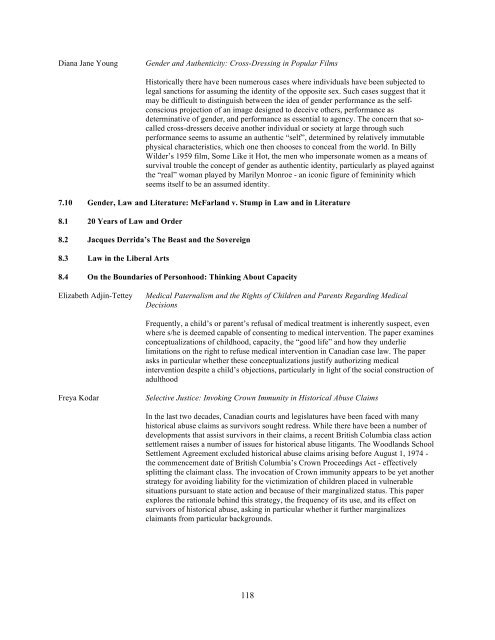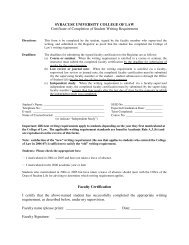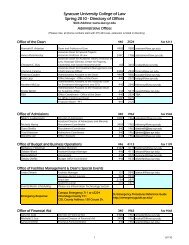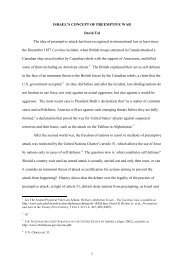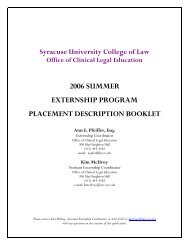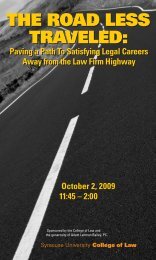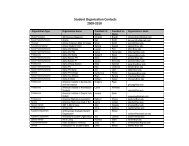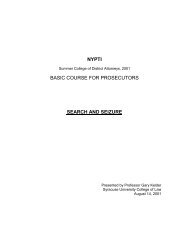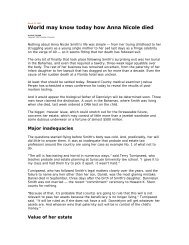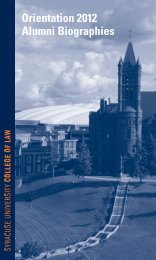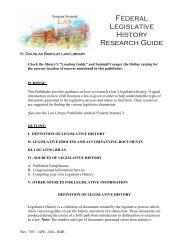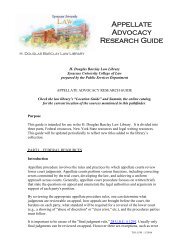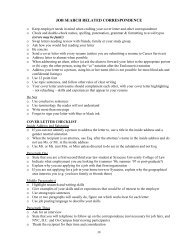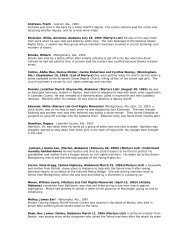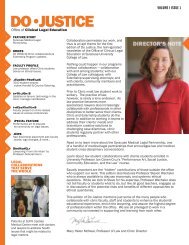2011 Conference Program (PDF) - Syracuse University College of Law
2011 Conference Program (PDF) - Syracuse University College of Law
2011 Conference Program (PDF) - Syracuse University College of Law
You also want an ePaper? Increase the reach of your titles
YUMPU automatically turns print PDFs into web optimized ePapers that Google loves.
Diana Jane Young<br />
Gender and Authenticity: Cross-Dressing in Popular Films<br />
Historically there have been numerous cases where individuals have been subjected to<br />
legal sanctions for assuming the identity <strong>of</strong> the opposite sex. Such cases suggest that it<br />
may be difficult to distinguish between the idea <strong>of</strong> gender performance as the selfconscious<br />
projection <strong>of</strong> an image designed to deceive others, performance as<br />
determinative <strong>of</strong> gender, and performance as essential to agency. The concern that socalled<br />
cross-dressers deceive another individual or society at large through such<br />
performance seems to assume an authentic “self”, determined by relatively immutable<br />
physical characteristics, which one then chooses to conceal from the world. In Billy<br />
Wilder’s 1959 film, Some Like it Hot, the men who impersonate women as a means <strong>of</strong><br />
survival trouble the concept <strong>of</strong> gender as authentic identity, particularly as played against<br />
the “real” woman played by Marilyn Monroe - an iconic figure <strong>of</strong> femininity which<br />
seems itself to be an assumed identity.<br />
7.10 Gender, <strong>Law</strong> and Literature: McFarland v. Stump in <strong>Law</strong> and in Literature<br />
8.1 20 Years <strong>of</strong> <strong>Law</strong> and Order<br />
8.2 Jacques Derrida’s The Beast and the Sovereign<br />
8.3 <strong>Law</strong> in the Liberal Arts<br />
8.4 On the Boundaries <strong>of</strong> Personhood: Thinking About Capacity<br />
Elizabeth Adjin-Tettey<br />
Medical Paternalism and the Rights <strong>of</strong> Children and Parents Regarding Medical<br />
Decisions<br />
Frequently, a child’s or parent’s refusal <strong>of</strong> medical treatment is inherently suspect, even<br />
where s/he is deemed capable <strong>of</strong> consenting to medical intervention. The paper examines<br />
conceptualizations <strong>of</strong> childhood, capacity, the “good life” and how they underlie<br />
limitations on the right to refuse medical intervention in Canadian case law. The paper<br />
asks in particular whether these conceptualizations justify authorizing medical<br />
intervention despite a child’s objections, particularly in light <strong>of</strong> the social construction <strong>of</strong><br />
adulthood<br />
Freya Kodar<br />
Selective Justice: Invoking Crown Immunity in Historical Abuse Claims<br />
In the last two decades, Canadian courts and legislatures have been faced with many<br />
historical abuse claims as survivors sought redress. While there have been a number <strong>of</strong><br />
developments that assist survivors in their claims, a recent British Columbia class action<br />
settlement raises a number <strong>of</strong> issues for historical abuse litigants. The Woodlands School<br />
Settlement Agreement excluded historical abuse claims arising before August 1, 1974 -<br />
the commencement date <strong>of</strong> British Columbia’s Crown Proceedings Act - effectively<br />
splitting the claimant class. The invocation <strong>of</strong> Crown immunity appears to be yet another<br />
strategy for avoiding liability for the victimization <strong>of</strong> children placed in vulnerable<br />
situations pursuant to state action and because <strong>of</strong> their marginalized status. This paper<br />
explores the rationale behind this strategy, the frequency <strong>of</strong> its use, and its effect on<br />
survivors <strong>of</strong> historical abuse, asking in particular whether it further marginalizes<br />
claimants from particular backgrounds.<br />
!<br />
118


